How to tell from listing language that the broker, seller, or landlord is ready to make a deal

GRAMERCY PARK: The listing for this two-bedroom duplex rental notes that there's no broker fee, and you'll get seven weeks shaved off your rent--a sure sign they're eager for takers.
We keep hearing that New York City's rental market is slowing across multiple boroughs, and that concessions are breaking records. And it turns out that this new reality is reflected not only in hard data, but also in the language of apartment listings. When sellers, landlords, and brokers are eager—perhaps desperate—to get a piece of property off their hands, that sense of urgency can come through in the words and phrases they use to describe apartments. And if you can read between the lines, you'll know when you have room to negotiate and get a great deal.
We spoke to Greg Moers, an agent with TripleMint (fyi, a Brick partner), and trawled StreetEasy to find examples of listings whose descriptions hint at an eagerness to find a tenant, and learned how you can make the most of having the upper hand.
Discounted rent and other price deductions
On the rental side, as a flood of luxury new developments open and lead to an oversupply, the market is seeing an influx of incentives to lure in new tenants. This often comes in the form of a month, or even two, of free rent. But, Moers cautions, the prices you see may not be what you actually get (or, rather, pay).
"What you're seeing advertised is the net effective rent," he says—that is, the total rent you'll pay for the year, divided by 12 months. "What they don't tell you is that you pay the gross per month, minus one or two months. There's a bait and switch at that level."
In the example below, the agent is actually being quite straightforward and providing all the information, though you'll need to read the description to get the complete details. In search results, the Washington Heights four-bedroom comes up as renting for $3,850 per month, but this number is prorated to include one free month. After the initial free month is up, the tenant will actually be paying $4,200 per month. (This also means that when the lease is up for renewal, the landlord can hike the rent above that amount, rather than the listed $3,850.) That said, the free month at least comes at move-in, whereas for many others, it's tacked on at the end of a year lease.
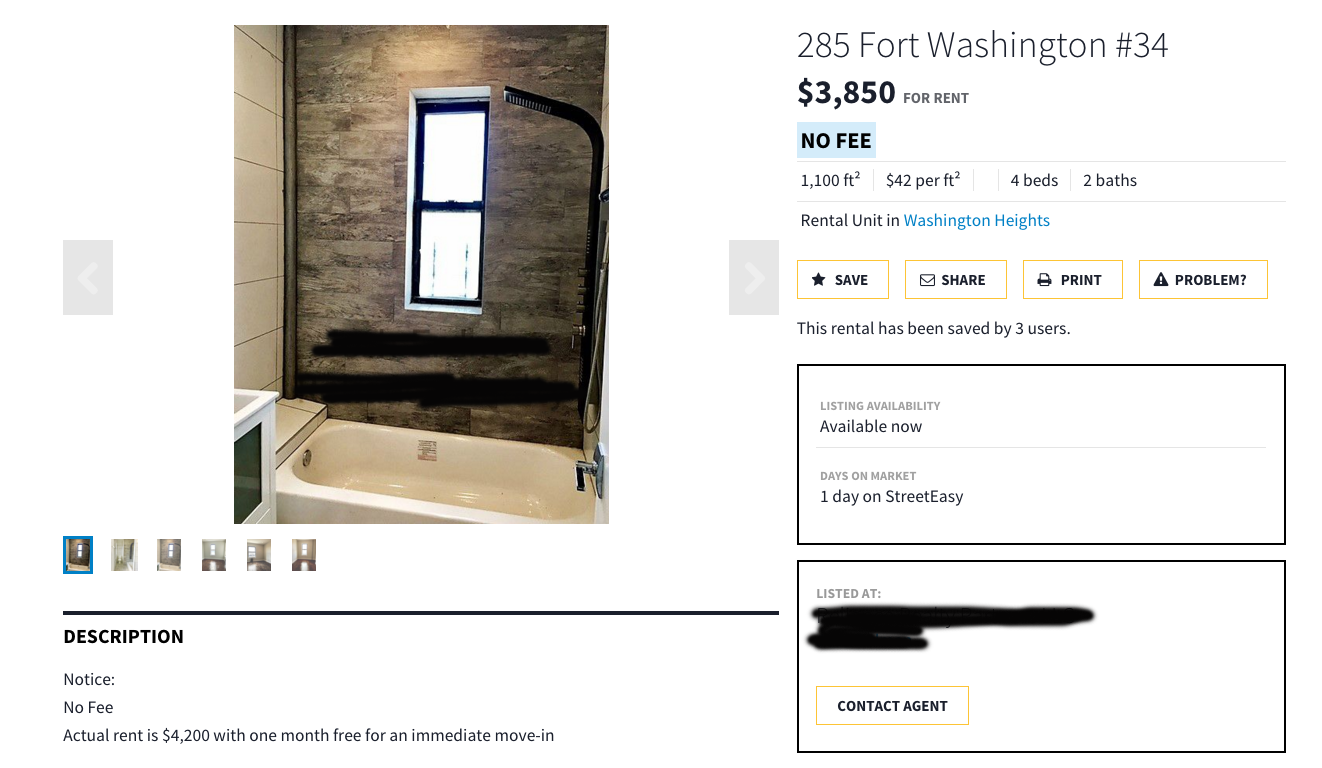
The listing goes on to note that this is an "amazing deal" and that there's no broker fee; also, renters can expect an "easy application process," all tenant-friendly language, so you may have room to talk down the actual monthly rent, too.
On the sales side, Moers says that he sees plenty of listings that come with price reductions, but they're often not advertised with that exact phrasing, which brokers consider aggressive language that puts them at a disadvantage. "I get emails every day that say 'price improvement' or 'price adjustment.' It's a softer way of saying, 'We haven't gotten offers and we want to get rid of this place'," he says.
He adds that when it comes to discounts on co-ops, though, buyers should keep their eyes open for signs of a particularly tough board. Some co-op listings with price reductions will mention a prior board turndown of a prospective buyer, of which Moers says, "That comes with a lot of question marks. What does that mean? Is this board really difficult? The phrase is a total red flag, and the co-op won't tell you anything about what happened."
This listing for a four-bedroom Vinegar Hill condo looks a bit more straightforward. It notes a price adjustment as well as being "priced to sell," and no wonder—it has been on the market for 219 days. And that $170,000 price chop seems to have enticed a savvy buyer, as the unit is now in contract.
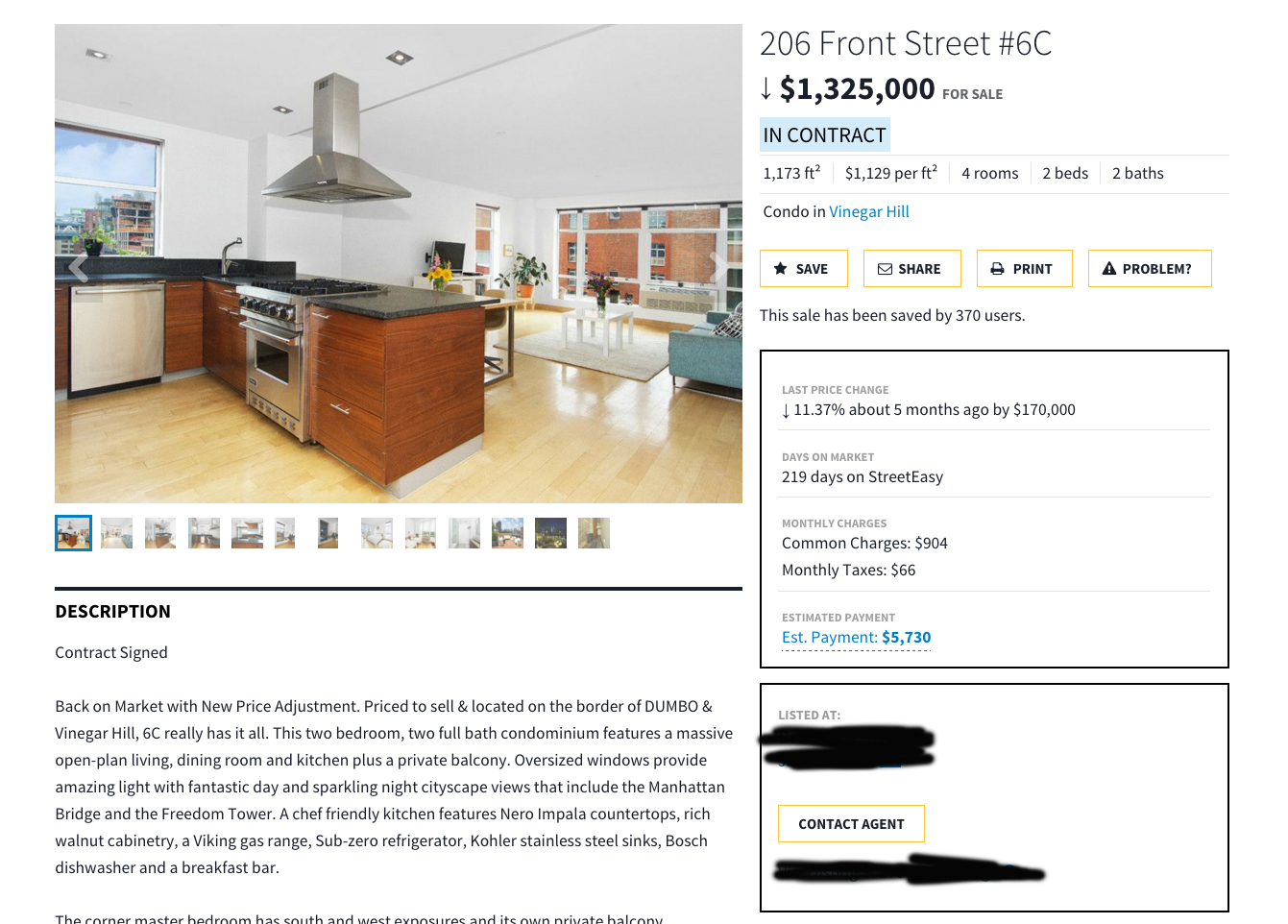
Other concessions
Another surefire way to divine a sense of urgency is to look for other types of concessions, and how they're promoted. As landlords seek ever more creative ways to attract tenants (without actually dropping the rent), they're now offering perks like gift cards, free use of building amenities, and more.
"I've seen units giving away a ton of home appliances, smart home technology, or AmEx gift cards of $500," Moers says. "What brokers are doing is pulling anything they can so you at least call them, and then you're in their system." He adds that sometimes property management will also throw in a year of free access to an amenity, like an in-building gym, that would otherwise require tenants to pay additional fees.
He points to this listing of a three-bedroom rental on the Lower East Side, which notes a host of enticements, including a waived broker fee and security deposit, a unit already equipped with an Amazon Echo, and even a reimbursement of moving expenses, up to $1500.
"They're saying, 'We need to get rid of this apartment immediately, and we'll even pay for you to move,'" Moers observes. "The broker has probably been trying to get it rented for quite some time."
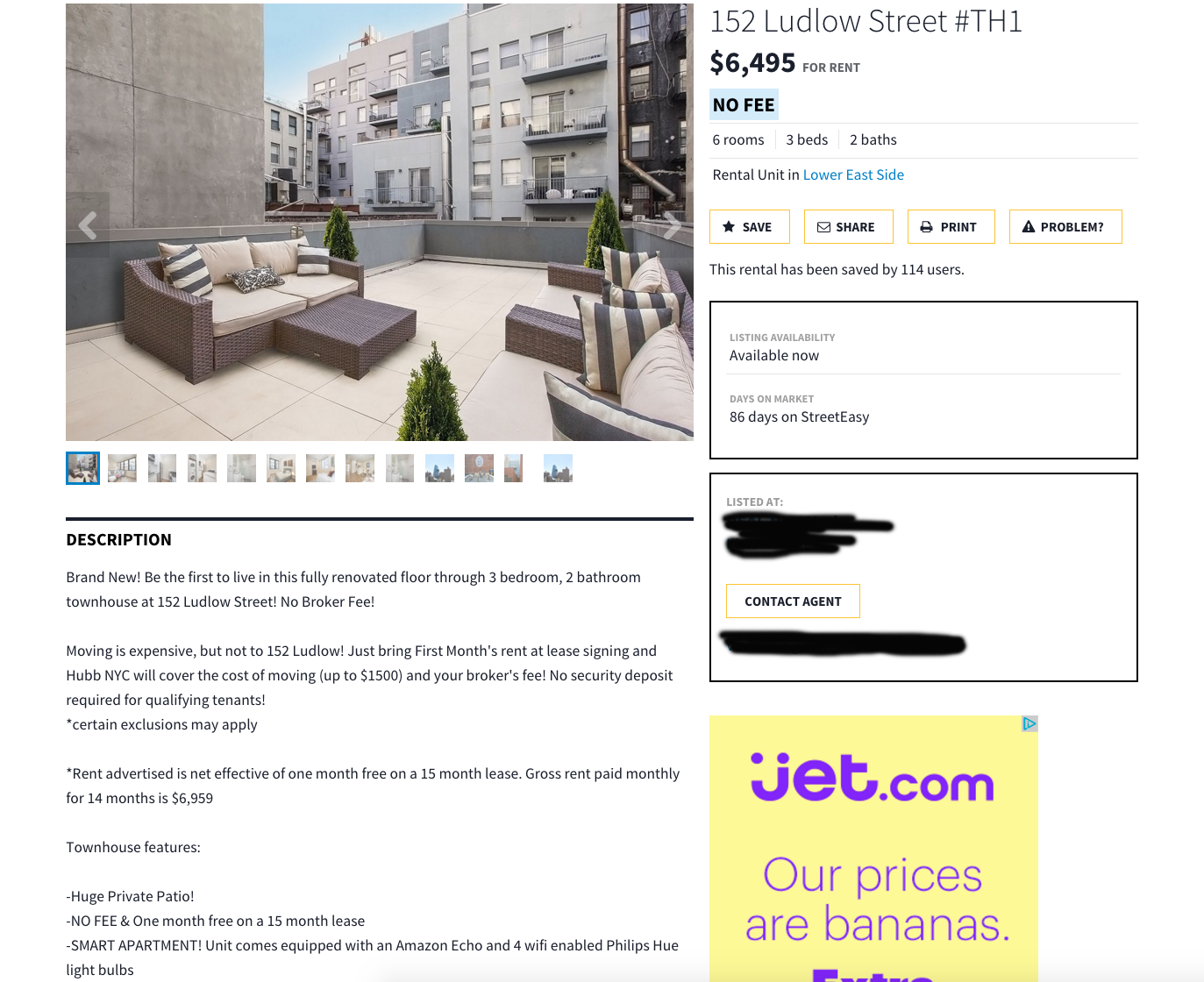
Exclamation points, all caps, and other cues they're getting desperate
Sometimes, brokers will make like Monty Hall with their phrasing. Take this three-bedroom Upper West Side co-op, where the listing promises renters "You Can Have It All!" with a "New Adjusted Price," and concludes, "LET'S MAKE A DEAL!"
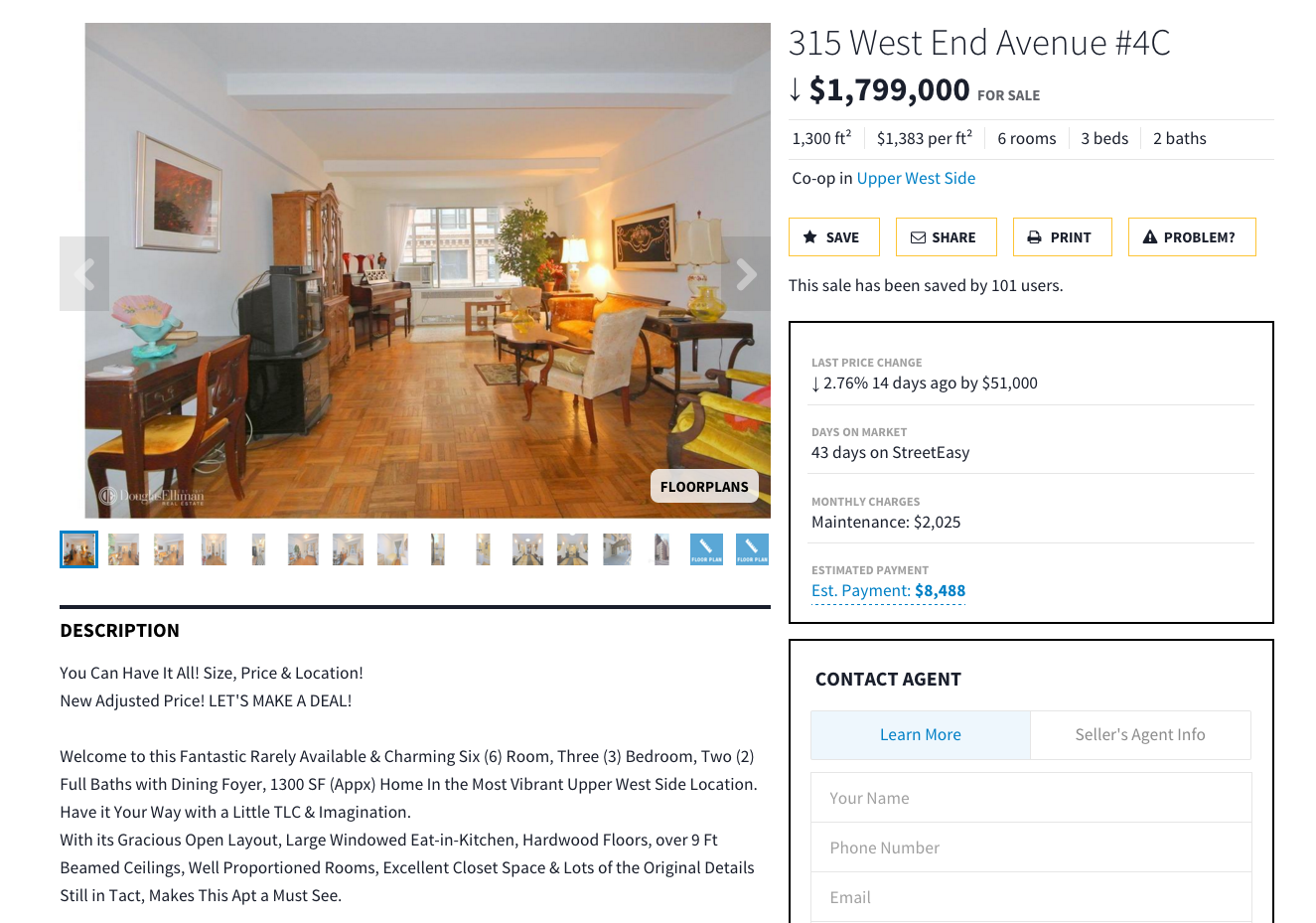
All those capital letters and exclamation points convey eagerness. Moers adds that for sales, key giveaways of thirsty-ness might include phrases like "Bring Your Buyers!" or "Bring Your Offers!"
This blogger at REtipster, which provides advice to real estate investors, confirms that exclamatory language is used to catch the eye of potential renters and buyers. "Try to be just obnoxious enough to get noticed," he writes, which you could take to mean that if the listing annoys you a little bit, it might mean the broker is in a rush to offload the property.
Again, though, prospective buyers should take such phrasing with a grain of salt. Moers says that it's no mistake when brokers deploy urgent-seeming language in their listing; in fact, they're hoping to create that sense of urgency.
"What we're seeing is that that's so easy to do, but you have no way of knowing what's really going on," he explains. "Brokers hide important information to get people bidding against each other, so they can sell for the highest price."
By giving prospective buyers the sense that the sellers are really willing to negotiate, then, they might attract more interest to a listing, kicking off competition that means the discounts aren't that huge after all.
How to make that deal
While it's relatively easy to discern desperation via listings language, it can be tougher to actually talk down a seller or landlord.
For rentals, Moers thinks it can help for prospective tenants to speak to the landlord or property management directly; the presence of a broker can make them less likely to negotiate, as they may already have to cover their fee to entice tenants, and they don't want to pick up even more costs.
The good news for renters, though, is that it may finally become more cost-effective for landlords to just come down on the rent, rather than throw in an increasing number of concessions.
"There's a turn happening in the market now," Moers says. "Thirty percent of rentals were coming with incentives. Now, there's more of a transition into lowering the overall cost of the rent. At the end of they day, they'd rather charge $5,200 a month instead of $5,600, rather than give away two months free. The net is more, they're getting more money, and you think you're getting a deal."
Although in a sense, even if the landlord ends up with more money in their pocket, renters are getting a deal, because their monthly rent will appreciate less at renewal time.
As for sales, it's a little more complex. "Sellers are only willing to go down so much," Moers says. "Most of these price adjustments or improvements are not significantly high numbers. You'll see anywhere from $10,000 to $100,000—if you're really pushing it."
That isn't written in stone, though: Take the Vinegar Hill condo discounted by $170,000. And this four-bedroom Carnegie Hill co-op, complete with Central Park views, has come down by $1.175 million, 10 percent of its original asking price.
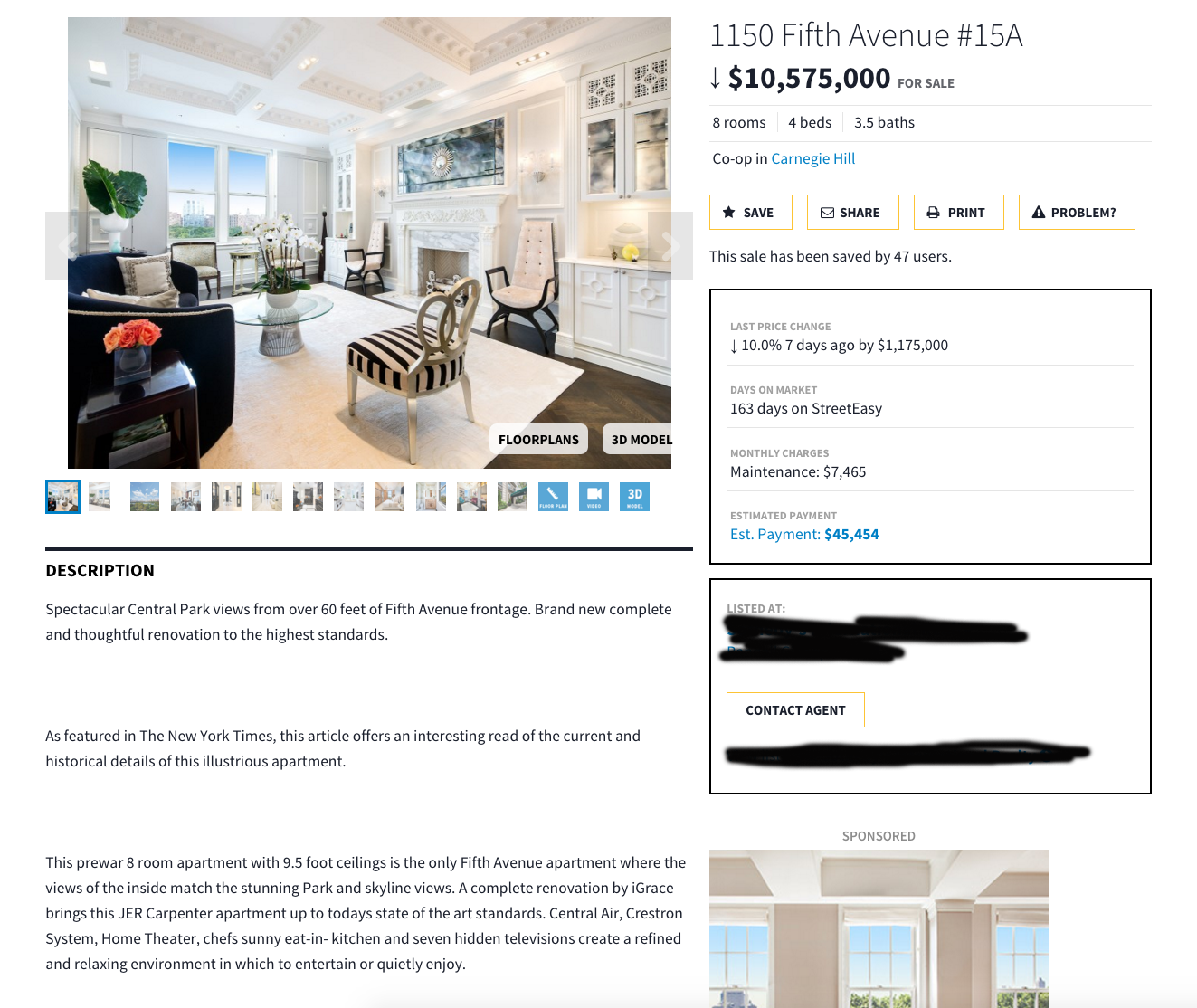
The listing also mentions having been featured in the New York Times, and that it has been updated with smart home tech. It seems like a confluence of signs, albeit subtle ones, that the broker is vying to grab your attention. A Curbed article points out that at the higher end of real estate listings, the language might be less blunt, so a seller's desperation isn't immediately apparent.
But with a bit of close reading of listing language, you could have the key to nabbing yourself a Fifth Avenue address at a discount.
You Might Also Like




























